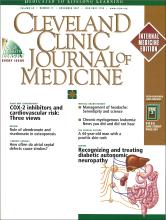ABSTRACT
Chronic myelogenous leukemia (CML) can usually be cured by bone marrow transplantation from matched donors. Donor T-cell activity from the graft is critical to maintaining remission. Myeloablation may not be necessary for cure. Non-myeloablative but immunosuppressive preparative regimens allow donor engraftment with less toxicity. Early combination therapy with interferon-alfa and cytarabine was the preferred option for patients who could not undergo bone marrow transplantation. Now, the advent of imatinib mesylate, a specific inhibitor of BCR/ABL tyrosine kinase, promises to change existing treatment paradigms
Footnotes
↵* The author has indicated that he has received grant research support from Sangstat, Novartis, Genta, and Protein Design Labs, and that he is on the speakers bureau of Cell Therapeutics. This article discusses therapies that are not yet FDA-approved for the use under discussion and are investigational.
- Copyright © 2001 The Cleveland Clinic Foundation. All Rights Reserved.






